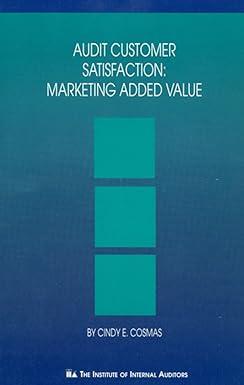Question
. A company is evaluating performance of its four divisions. The divisions are all investment centers. The following information is given: Division Profit ROI Residual
. A company is evaluating performance of its four divisions. The divisions are all investment centers. The following information is given:
| Division | Profit | ROI | Residual Income | Net operating assets |
| A | $720,000 | 12% | $100,000 | $6,000,000 |
| B | $200,000 | 20% | $70,000 | $1,000,000 |
| C | $630,000 | 9% | $400,000 | $7,000,000 |
| D | $25,000 | 5% | $19,000 | $500,000 |
Which division performed the best?
- Division A
- Division B
- Division C
- Division D
2. Residual income is the difference, measured in dollars, between:
A) contribution margin and the average operating assets.
B) net operating income for stockholders and the interest paid to creditors.
C) net operating income and the minimum required income.
D) net operating income of current year and net operating income of previous year.
7. Which of the following is false about the flexible budget about costs?
- The flexible budget provides a manager with flexibility in budgeting production costs, so that the manager can make necessary adjustments in setting per-unit standards.
- With a flexible budget a manager can determine what costs should have been attained at a given level of activity.
- The flexible budget can be used to compare the budgeted cost with actual cost at any level of activity.
- With a flexible budget, a manager can be judged on how well the manager is able to keep costs compared to costs allowed for the actual production level.
8. Johnson Company buys and resells a consumer product. Daniel is the manager of East Store of the company. He is authorized to make all sales-related decisions (such as prices, sales mix, advertising, promotion, etc.) and merchandise purchasing decisions (such as supplier selection, negotiating purchase prices, etc.). But he has no decision rights on purchasing or selling operating assets other than merchandise. Daniel is the manager of a(n):
- cost center
- revenue center
- profit center
- investment center
9. Managerial performance can be measured in many different ways including return on investment (ROI) and residual income. A good reason for using residual income instead of ROI is: A) ROI does not take into account both turnover and margin.
B) Managers are more likely to accept projects that are beneficial to the company.
C) A minimum rate of return does not have to be specified when the residual income
approach is used.
D) Residual income can be computed without having to measure operating assets.
10. Echo is an NFL player. He has hired an agent, Tom. Tom is to negotiate Echos salary with Echos team. Echo does not know exactly what and how things are done in the negotiation. From the standpoint of Echo, which of the following way is the most worry-free (worrying least about whether Tom works hard or not OR whether Tom cheats or not) way to compensate Tom?
A) Pay Tom a flat amount (e.g., $800,000)
B) Pay Tom on an hourly basis (e.g., $500 per hour * Reported work hours)
C) Pay Tom based on Echos salary level ($20% of Echos salary is less than $1 million;
$700,000 if Echos salary is at least $1 million)
D) Pay Tom based on Echos salary (e.g., 30% of Echos salary)
11. A company lets a manager set the goal and pays the manager based on his/her goal and actual sales. The company wants the manager to be honest (does not want the manager to understate the goal intentionally and over-achieve the goal). The compensation formula is:
C = 0.3 G + b (A G), (assume that A G)
where, C = compensation; A = actual sales; G = sales goal set by manager
For this formula to work as intended, "b" can possibly take which of the following
values?
- 0
- 0.2
- 0.4
- 1
12. Which of the following is false regarding how to make correct decisions?
- All irrelevant costs can be disregarded.
- Future costs that are different among different alternatives should be considered.
- In a special order decision, qualitative factors should be ignored.
- Past costs that are different among different alternatives should be ignored.
13. Last month, Jeff searched for a new job. He contacted three companies (A, B, and C). He incurred a total of $1,250 in the searching process ($500 for Company A, $300 for Company B as indicated below; and $450 for Company C). Later, Jeff received offers form Companies A and B. He is trying to decide which one he will accept. The following information is available:
Job Offer A Job Offer B
(1) Base salary $40,000 $40,000
(2) Bonus None Depending on performance
(3) Moving allowance $2,000 $2,000
(4) Signing bonus $1,000 $0
(5) Job search costs $500 $300
Select the items that are relevant to Jeff's decision.
A) (1), (2), (3), (4), (5)
B) (1), (2), (3), (4)
C) (2), (4), (5)
D) (2), (4
Step by Step Solution
There are 3 Steps involved in it
Step: 1

Get Instant Access to Expert-Tailored Solutions
See step-by-step solutions with expert insights and AI powered tools for academic success
Step: 2

Step: 3

Ace Your Homework with AI
Get the answers you need in no time with our AI-driven, step-by-step assistance
Get Started


